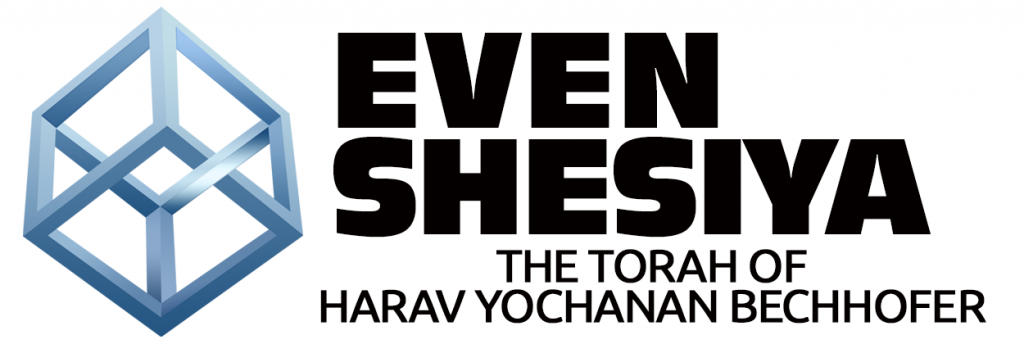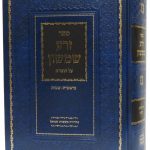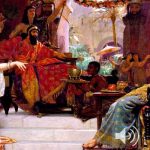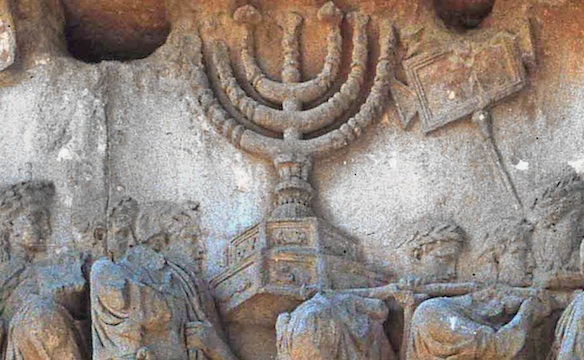Click here to download PDF
To Count is to Love?
Sefer Bamidbar is known as “Chumash HaPikudim” – The Book of Numbers because it has in it the census of the Jewish people. In the opening of this week’s parsha Moshe is commanded to conduct a census. Rashi (1:1) explains: “because of Hashem’s love for the Jewish people he is constantly counting them. When they left Egypt he counted them, when they fell by the sin of the golden calf he counted them to know how many were left, and when Hashem comes to put his Divine Presence amongst them He counts them. On the 1st of Nisan the Mishkan was erected and on the first of Iyar he counted them”
How does counting show ‘love’? How does Counting accomplish anything positive? This directly contradicts what the pasuk Shmos (30:12) says that when conducting the census the Jews have to give the half-shekel to be counted instead of counting them by head – so there should not be a plague! Rashi explains that when counting there is “Ayin Harah” – evil eye which can bring on calamities as happened with the census days of Dovid HaMelech. How is ‘Counting’ an act of love if it could endanger the counted? How are we to reconcile these two opposite aspects of being ‘counted’?
What happened to 50?
We have we have become quite accustomed to Counting during the last 7 weeks as we are counting the Omer in preparation for Shavuos. How is counting a preparation for receiving the Torah? Furthermore, the Torah says to “count 50 days”, but the 50th day, which is Shavuos itself, is not part of the count! If it’s not counted it’s not the 50th. Why isn’t it counted and why is it called the 50th day?
The uncountable Number
In this week’s Haftarah (Hoshea 2) it says: “The number of the children of Israel will be like the sand of the sea that cannot be measured and not counted and instead of being called ‘not my nation’ they will be called ‘children of the Living G-d’ ”. The first part of the pasuk is oxymoronic! There’s a ‘number’ to the children of Israel which “cannot be measured nor counted” – if it’s a ‘number’ then it in of itself is a definite ‘count’! What is a ‘number’ that cannot be counted?
Counting – Good or Bad?
We mentioned before Rashi that says that counting brings “ayin harah”. There are cases where counting is not as lethal but it is certainly devoid of blessing! The Gemara (Taanis 8b) says that a person who wants to measure how much grain he has is allowed to pray before the measurement “May there be blessing in this silo” but after he after he measured the grain he can no longer pray and it would be a “Tefillas Shav” – a Prayer in vain because “there is no blessing in something weighed, or measured, or counted”! However, there’s another aspect to counting. Regarding the laws of “Bitul” – annulling forbidden Food, the Gemara (Beitza 3b) states that something that is sold by individual count cannot be annulled – even in a thousand! Having its own distinct ‘number’ makes something too important to be annulled even though that same number strips it of all blessing and makes it vulnerable to “Ayin Hara”. How do we reconcile these two aspects?
Two Aspects of Counting
There is a dual nature to numbers. We mostly relate to numbers as a way to quantify. We use numbers to make measurements. Whether it’s 3 ft. long, 3 light years away, weighs 3 lbs., or there are three objects in a box. Once something is measured it has been given borders and limitations. It has been determined that it is so much and not more. That aspect of counting and measuring is limiting and therefore negates blessing. Having been measured or counted establishes an absolute maximum for that which has been measured. It can only be less moving forward. That’s how counting facilitates “Ayin Harah”. However, there is another aspect to this. The action of counting and measuring is a mental activity. It is the mind taking the measurements! Mathematics in Hebrew is “chesbon” the root of the word is “chashav” – to think. The numbers and the calculations are all in the mind. Assigning a number to something is a mental activity it is something that you are “choshev”- thinking. Something ‘thought through’ or ‘calculated is “chashuv” – which also means important! What makes something “important”? If it’s worth thinking about, if it’s something worth taking up space in your mind and heart, if it’s worthy of attention that’s what makes it “Chashuv”- important! If something is important enough it gets its own number, and vice versa, if you gave it its own number then it must be important if you gave it that much thought! This explains why something that is sold by number cannot annulled. If it was important enough (“Chashuv”) that you thought about it (“Chashav”) and gave it a number (“Cheshbon”), it has your attention. That’s what makes it “important” and thus never annulled.
The Census in the Desert
We can now understand on an Elementary level the duality in the census in the desert. It is an act of love. It shows that we’re in “Hashem’s thoughts”. We are counted is an act of Him thinking of us, showing that we are rooted in the very thoughts that he had for creation itself. As Rashi says: “Bereishis – for the ‘first’ – for the sake of the Jewish people who are called ‘the first’”. Hashem envisioned the idea of the Jewish people even before he created the world! We are rooted in “His thoughts” and as an expression of that we are being ‘counted’. Having His omnipotent thoughts upon us makes us the eternal nation that can never be annulled! However, since counting also ascribes a quantity, which negates blessing and makes us vulnerable to “Ayin Harah”, the Torah said to count the half-shekel per person. The ‘quantifying aspect’ will be on the coins, not on the people! Hashem’s thoughts are on the people but the quantity is on the coins. These coins then went for the Mishkan and subsequently for the Korbonos that further atone and protect us from “Ayin Harah” (Rashi).
Numbers vs Quantities
Numbers themselves are not quantities. They are used to make quantities but they themselves are pure Concepts. We have mentioned in the past that this is what’s alluded to in what we say on Seder night in the “Echod mi yodea”: “who knows one? I know one… who knows two? I know two…..” Numbers are pure Concepts and we’re looking for the Jewish idea that is the greatest expression of that concept. In last week’s Parsha sheet we discussed “5” and “6”. In the parsha sheet for shemos we gave the example of “who knows three? I know three! Three are the forefathers of the Jewish people”. What does the number “3” represent? One extreme, the opposite extreme, and the ‘third’ is the middle that could be the arbitrator and synthesizer between the two poles. These are our three forefathers Avraham whose ‘Middah”-attribute is “Chesed”- kindness. Yitzchak whose “Middah” is the polar opposite of “Gevura” –might/judgment. Yaakov, the third forefather’s “Middah” is “Tiferes” which is also called “Torah”. “Tiferes” is inclusive of “Chesed’ and “Gevurah” and the “Torah” decides when it’s time for kindness and when it’s time to show might and toughness. We have demonstrated that numbers are just pure ideas- making quantities is just an application of those ideas! What this we can understand some of the paradoxes that we find in numbers. These paradoxes are resolved (at least in part) when we realized that numbers themselves aren’t quantities. A few examples: there are infinite fractions between any two numbers, but there’s no such thing as an infinite distance between two points. There is the irrational number that one could spend his whole lifetime writing out and still not be finished and will never finish – even though when applying to a quantity it might just be the mathematical expression of a very small thing. These paradoxes are because we are confusing ‘numbers’ with ‘quantities’. The quantity may be very small but the ‘number’ is a concept which isn’t physical and therefore has no physical limitations. Our minds automatically associate numbers with quantities, but they are much more than that. What if we could break through to the pure number itself, without applying it to quantities?
Number with no Quantity
This is what the Navi was saying: “The “number” of the children of Israel will be like the sand of the sea that cannot be measured or counted….” – meaning to say that in the future there will be a “number” as in ‘concept’ to the Jewish people –meaning that it will be apparent that they are the focus of “Hashem’s thoughts”! That “number” will be a pure unlimited infinite concept that cannot be limited by any measurement or counting. The Rambam in the Moreh Nevuchim (Section 1 chapter 7) says that the term “child” applies to thoughts! The thinker is the first generation, the thoughts produced are the second generation. As we are the “unlimited Number” in “Hashem’s thoughts” thus we are called “…..children of the Living G-d”
Counting Middos
During the days of the Omer we are working on refining our “middos”- character traits. Why are character traits called “middos” which literally means ‘measures’? Character traits are very distinct traits that have their ‘boundaries’ in definition and in action. For instance: kindness is only kindness. Kindness is not inclusive of toughness. Toughness is only toughness and not inclusive of kindness. Kindness is a character trait that will produce a very specific type of actions. Toughness is a character trait that will produce a totally different type of specific actions. They are indeed ‘concrete measurements’ with rigid definitions of distinct personality traits. Another aspect of their limitations is that they are purely traits, habits, programming, and instincts but not moral values. Moral values are a matter of conscience! The Gemara (Eiruvin 100b) says that even if Torah would not have not been given we could have learned Mitzvos from the world around us. We could have learned not to steal from the ant. Ants do not steal from each other! If an ant touches something another ant will stay away even if the first ant is no longer holding it. But here’s the catch: they don’t steal from each other but they steal from us! If we leave food out on the counter they will invade it! Ants don’t steal because of instinct, not as a matter of conscience. They have a certain “middah” which is only a ‘measure’ – a specific program, not a moral value. Their ‘programming’ is only as far as each other, they have no ‘programming’ regarding other species. The Jewish people are not meant to copy the ants but to observe that the ants have this trait and Abstract that trait into a moral value and as a matter of conscience. When it becomes a moral value then you don’t steal from anybody! All character traits could be forces for good if they’re under the guidance of a conscience that’s making moral decisions. Without a conscious even “good middos’ can be propelling forces for destructive acts. During the days of the Omer we count a different “middah” every day. By counting we are investing thought into the middos. We are connecting them to the realm of thought and subjugating it to the conscious. Such a character trait is important (“chashuv”) because it is thought out – not a habit!
Addition
In our count we are adding up. Not the 3rd day of the omer but rather “3 days in the omer”. When character traits are distinct measurements onto their own they could be evil simply because they’re not balanced with the other character traits. There’s a time and place for each character trait. In the adding we are connecting them to each other through thought. The conscience will be the arbitrator when it’s time for a character trait to be active and when to give way. Through the adding the character traits go beyond their distinct measurements to be cooperative and supplement each other. By no coincidence there are 49 days to the omer. The numerical value of the word “Middah” (“Mem” “Dalet” “Heh”) is 49. In course of these 49 days we are connecting these distinct measurements (Middos) to the realm of thought and through that to each other. That’s what converts character traits into moral values.
Shavuos – Beyond counting
The 50th day is the day of the Torah itself – the pure idea! The Torah is the “world of ideas” that all reality was based on. Just like the 50th is the yovel year which is called “Forever” is not just “another year” it is the reset button for all of reality. All Jewish slaves go free and all ancestral inheritances go back to their original owners. The “50th” is the number that is not to be counted or measured! It’s a pure concept that’s above the idea of quantity. It’s only called the 50th because we prepared for it for 49 days – but it itself is not a quantity, it’s a pure concept – it is the day of the Torah itself. That is why the 50th day is not counted! It is the number that is not to be measured or counted because it is the pure infinite idea of the Torah!









